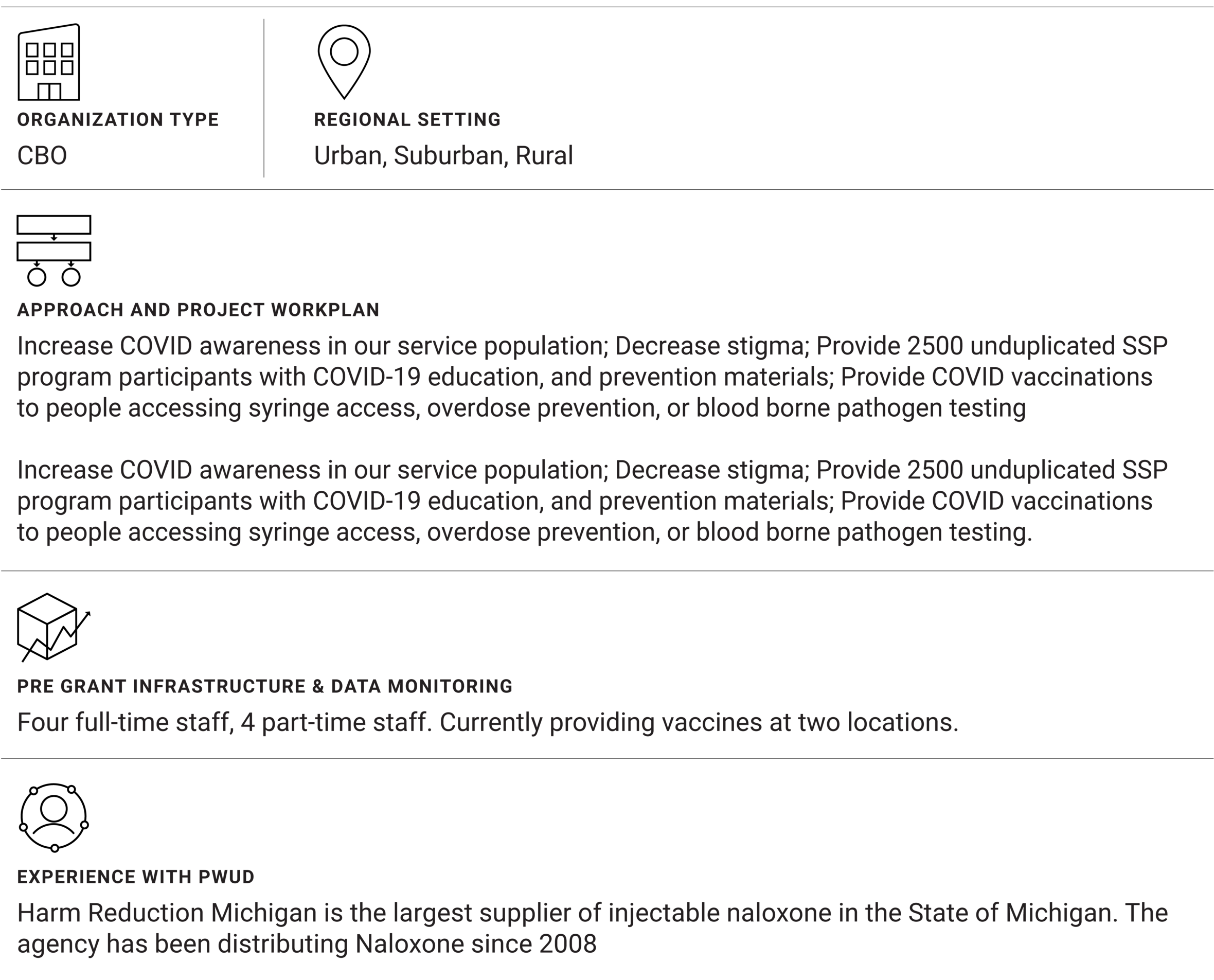
Harm Reduction Michigan (HRMI)
Overview
Harm Reduction Michigan (HRMI) is an integrated harm reduction program offering syringe access and disposal, overdose prevention education and naloxone distribution, linkages to substance use treatment, and HCV treatment. HRMI’s service catchment area spans 14 counties throughout upper Michigan. They have 6 brick and mortar locations and offer mobile services, including delivery, given that many HRMI participants do not possess driver’s licenses, and public transportation options in Michigan are sparse. The Traverse City HRMI storefront site is on a bus line, but participants drive to other HRMI sites or have services brought to them. In addition to transportation barriers, Michigan can be famously cold and snowy. Staff sees a drop in program participation in the winter months, and homeless sites disperse, and people are often hard to locate.
Creative Approaches
Repurposed newspaper boxes to distribute Naloxone
Harm Reduction Michigan employed the brilliant idea of repurposing newspaper boxes into naloxone dispensers, strategically placing them across the city for easy access. This innovative solution aimed to combat opioid overdoses by providing a lifesaving antidote to those in need. By utilizing existing infrastructure, the grantee maximized naloxone availability and ensured that anyone who required it could quickly obtain this crucial medication. Through this community-driven initiative, lives were saved, and crucial progress was made in the fight against the opioid crisis.
After-hours safe-use supply distribution using lockboxes
HRMI has taken a proactive approach to ensure access to safe-use supplies for their organization by placing a Lockbox with safe-use supplies on their front door after hours. This allows participants of the syringe service program to obtain supplies and educational materials even after regular operating hours. By calling the phone number displayed on the Lockbox, participants can receive the lockbox key code, ensuring secure and convenient access to supplies for all participants.
Delivery/Mobile medical services
Their program offers a range of essential services through its delivery platform. With a primary focus on safety, the program ensures that individuals have access to safe-use supply kits, vaccinations, and vital medical services, all conveniently delivered right to their doorstep. By providing these essential resources and healthcare assistance, the program aims to reduce harm and enhance the overall well-being of its participants.
Challenges
Political pushback
Michigan, though currently led by a Democratic Governor Whitmer, leans conservative in general, and conservative politics can pose both financial and operational challenges for HRMI. Like other SSPs who operate in multiple counties, HRMI finds itself having to navigate a complicated patchwork of politics on a county-by county basis, and in some counties HRMI must manage relationships with unsupportive sheriffs, and established networks of substance use disorder treatment providers who perceive HRMI as a threat to their expertise and funding. After an onsite medical emergency at one HRMI location, for example, building owners refused to renew HRMI’s lease in that location.
Funding challenges
HRMI has also struggled to maintain sustainable funding sources, as federal and state funds tend to be funneled toward abstinence-based models as opposed to harm reduction services. Pam Lynch, Executive Director of HRMI, explains, “We’ve been in a Republican-led state for 30 years. The old school abstinence-based providers, the federal money, it comes to the state. And then the state funnels it directly to their Bureau of Substance Abuse, and so on. That Bureau of Substance Abuse has had the same providers for the last 15 probably 50 years. They now call it the ‘Office of Recovery-Oriented Systems of Care – but it’s the same people with the same ideology.’ In this system, harm reduction programs are consistently insufficiently funded.
Vaccine Acquisition
It has also been challenging for HRMI to attain hepatitis A and B and COVID vaccine to administer to HRMI participants. The State Health Department was not willing to donate vaccine to HRMI directly and wasn’t able to station a Health Department public health nurse at an HRMI site on a regular basis. HRMI has developed creative workarounds, like ordering hepatitis vaccines through a private provider who administers it onsite to participants, but they don’t yet have the capacity to bill Medicaid for the vaccine. “We’ve found out our provider can order [hepatitis A and B vaccine] so we can get it through our provider, but we have to spend, I think they’re $125…for the combination vaccine. And that’s expensive. And we haven’t figured out how to bill Medicaid for that. So, we need to figure that out.” In addition to having to employ some ingenuity to acquire COVID and hepatitis vaccine, HRMI has encountered other barriers to vaccination for their participants. Notably, in Kalkaska County HRMI was going to rent a site for storefront programming but was forbidden by the landlord to administer vaccine there. HRMI had to pursue other options in that county.
Total Monthly Data
|
Service |
Number of Encounters |
|
Received education on COVID and COVID vaccination |
2174 |
|
Referred to COVID vaccination |
1740 |
|
COVID-19 Vaccination (on-site) |
329 |
|
COVID-19 Vaccination (off-site) |
28 |
| Monkeypox vaccinations | 0 |
| Other vaccinations | 105 |
| Total encounters | 6425 |
